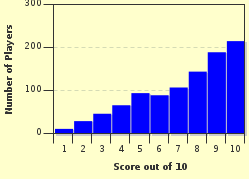Quiz Answer Key and Fun Facts
1. Gabon became independent on August 17th, 1960. Which nation did it get its independence from?
2. Gabon's largest river is the Ogooué. In which neighbouring country does this river originate?
3. The highest point in Gabon is disputed, but many consider it to be Mont Iboundji. The mountain range this peak is in is named for which explorer?
4. Having served 42 years, this President of Gabon was the longest-serving leader in all of Africa when he passed away in office. Who was this leader with a drum-sounding name?
5. Gabon's economy was heavily reliant on one product. When this product's prices fell in the late 1980s it harmed the Gabonaise economy. What was it?
6. Even though French is the only official language of Gabon, what is the widely-spoken second language?
7. Gabon is notable for having hundreds of caves with karst topography. Karst? What does that mean the caves contain?
8. Gabon's capital, Libreville, was founded by which of the following groups?
9. As you can probably surmise, Gabon sits off the extension of the Atlantic Ocean called the Gulf of Guinea. However, what is the name of the body of water bordering the northern part of the country usually referred to as?
10. Of course, no quiz about Gabon is complete without a question concerning the equator. The equator passes through seven countries in Africa and twelve worldwide--one of them happens to be Gabon. Which of the following of Gabon's towns is closest to the equator?
Source: Author
LeoDaVinci
This quiz was reviewed by FunTrivia editor
Pagiedamon before going online.
Any errors found in FunTrivia content are routinely corrected through our feedback system.

